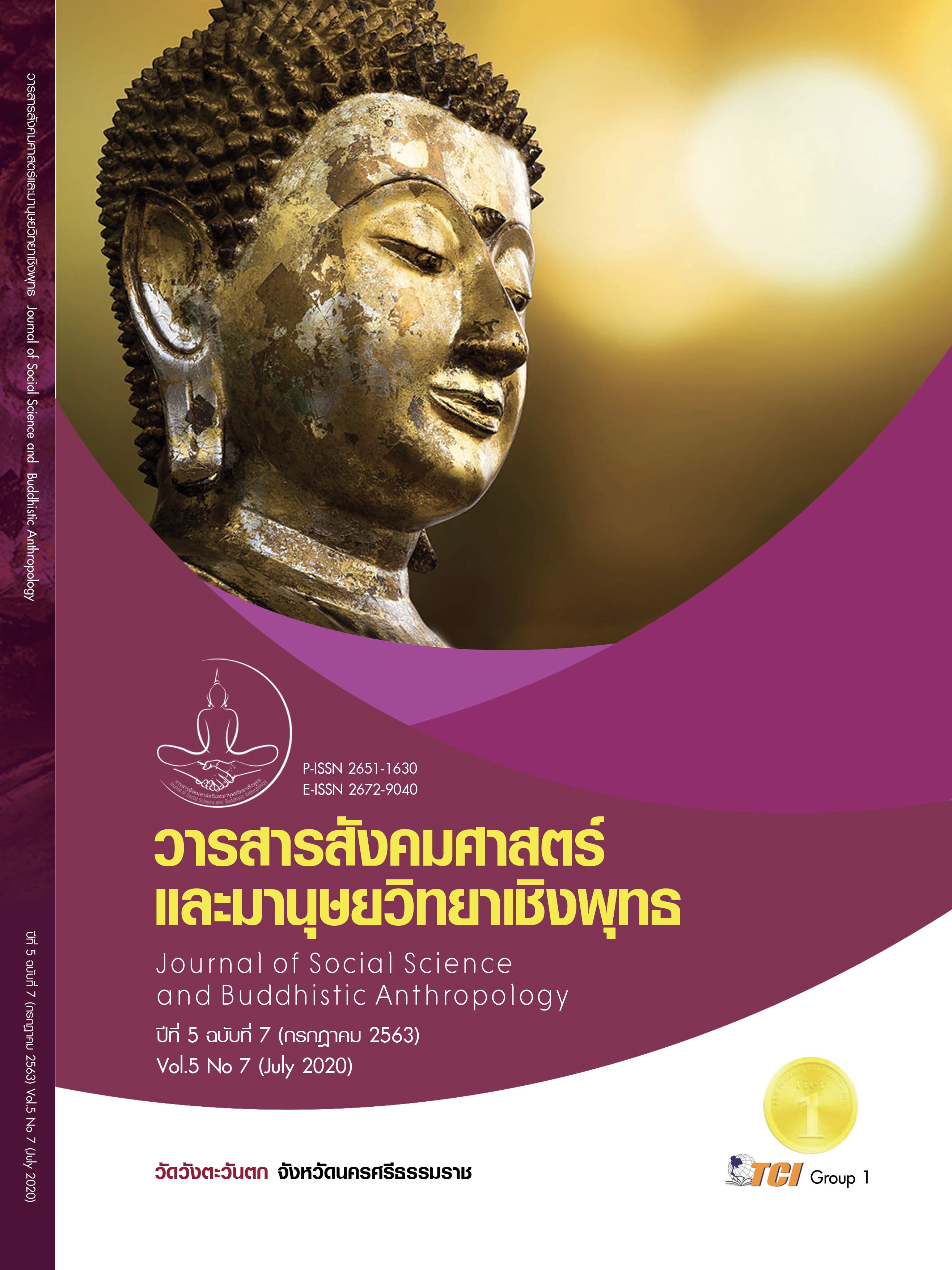THE PATTERN OF APPLICATION OF BUDDHA - DHAMMA TO DEVELOPMENT OF DEMOCRATIC INNOVATION IN SCHOOLS
Keywords:
Buddha - Dhamma, Dhammmadhipateyya, Democratic Innovation in SchoolAbstract
The objectives of this mixed methods research (quasi – experimental) are 1) to study the state of the democratic process management in the classroom and schools at the basic education level 2) to analyze buddha-dhamma that related to the democracy, and 3) to propose a model for the application of the buddha-dhamma to develop democratic innovation in the classrooms, basic education. Sample groups include the administrators of 9 schools in Bangkok and suburbs and 27 students in Mattayomsuksa 1 of Thammasat Secondary School. The researcher studied the operating conditions of 9 schools, analyzed the buddha-dhamma to be used in organizing democratic development activities in the classroom, use questionnaires and interview forms to collect data including analyzing content from focus group discussions. The quantitative data, the researcher used the frequency distribution method, then found the percentage / average value; for qualitative data, used content analysis. The results showed that the democratic classroom activities had the highest mean ( = 4.36, S.D. = 0.50). The researcher found that the seven principles of Aparihaniyadhamma are the most referenced. After the applying of the principles, most students think that everyone has equal rights and freedom (
= 4.55 S.D. = 0.51). The experts have provided opinions as an essential guideline for applying buddha - dhamma to develop democratic innovations in the classroom of basic education as follows: 1) the development or promotion of democracy among youths must lead to their way of life 2) Saraniya Dhamma is the Buddhist doctrine that should be carried out in parallel with the Aparihaniyadhamma 3) the development of democratic innovation in the school is the duty of everyone in the school and 4) the new generation of children are ready to learn and behave in more democratic ways. If the school can put it into practice by introducing with small units such as in the classroom, it will be another practical way to promote sustainable innovation for democratic development in Thai society.
References
เกชา ศักดิ์สมบูรณ์. (2550). ศึกษาระดับความคิดเห็นของกำนัน ผู้ใหญ่บ้านที่มีต่อการพัฒนาประชาธิปไตยในหมู่บ้านของอำเภอเมือง จังหวัดราชบุรี. ใน วิทยานิพนธ์ศิลปศาสตรมหาบัณฑิต สาขารัฐศาสตร์. มหาวิทยาลัยเกษตรศาสตร์.
ชายแดน เดชาฤทธิ์ และอัญชลี ชยานุวัชร. (2561). การศึกษาประสบการณ์การทำผิดวินัยของนักเรียนระดับชั้นมัธยมศึกษาตอนต้น จังหวัดปทุมธานี. วารสารนวัตกรรมการเรียนรู้, 4(1), 1 - 20.
เชาวนะ ไตรมาศ. (2550). ข้อมูลพื้นฐาน 75 ปี ประชาธิปไตยไทย 2475 – 2550. กรุงเทพมหานคร: สุขุมและบุตร.
ธำรงศักดิ์ เพชรเลิศอนันต์. (2561). การปฏิวัติ - รัฐประหารในการเมืองไทยสมัยใหม่. กรุงเทพมหานคร: มูลนิธิโครงการตำราสังคมศาสตร์และมนุษยศาสตร์.
ปรมต วรรณบวร และคณะ. (2560). ความเป็นพลเมืองเพื่อการส่งเสริมประชาธิปไตยในท้องถิ่น. วารสาร มจร สังคมศาสตร์ปริทรรศน์, 6(2), 85-100.
ประยงค์ แสนบุราณ. (2557). หลักธรรมในการปกครองของพระพุทธศาสนา. มนุษยศาสตร์สังคมศาสตร์ มข, 31(3), 139-158.
พชร สมคำ และ ปิยะพงษ์ บุษบงก์. (2560). แนวทางการเสริมสร้างคุณลักษณะประชาธิปไตยของนักเรียนระดับชั้นมัธยมศึกษาตอนปลายในเขตอำเภอโกสุมพิสัย จังหวัดมหาสารคาม. ใน การประชุมวิชาการ มหาวิทยาลัยมหาสารคามวิจัย ครั้งที่ 13.
พระเทพคุณาภรณ์ (โสภณ โสภณจิตฺโต). (2552). “อปริหานิยธรรม”, พุทธศาสนา และ ธรรมะ. เรียกใช้เมื่อ 18 เมษายน 2563 จาก https://palungjit.org/threads/ ۩۞۩-อปริหานิยธรรม-۩۞۩.171679/.
พระธรรมโกศาจารย์. (2558). ศาสนาประจำชาติไทย. เรียกใช้เมื่อ 16 พฤษภาคม 2563 จาก https://www.mcu. ac.th/article/detail/14216
พระพรหมคุณาภรณ์ (ป.อ. ปยุตฺโต). (2549). ธรรมาธิปไตยไม่มา จึงหาประชาธิปไตยไม่เจอ : (จุดบรรจบ : รัฐศาสตร์กับนิติศาสตร์). กรุงเทพมหานคร: พิมพ์สวย.
__________(2555). นิติศาสตร์แนวพุทธ. กรุงเทพมหานคร: วิญญูชน.
พระภสุ ผลาโณ และคณะ. (2561). ความสัมพันธ์ระหว่างหลักธรรมกับการปกครองรัฐตามแนวพระพุทธศาสนาเถรวาท. ใน สูจิบัตร การสัมมนาวิชาการระดับชาติ ม จ ร ครั้งที่ 4.
ไพรัช พื้นชมภู. (2560). หลักรัฐศาสตร์ที่ปรากฏในพระไตรปิฎก : ประชาธิปไตย. วารสาร มหาจุฬาวิชาการ, 4(1), 149-167.
มหาวิทยาลัยธุรกิจบัณฑิตย์. (2559). รายงานการวิจัยเพื่อจัดทำข้อเสนอเชิงนโยบายการพัฒนาการศึกษาเพื่อสร้างความเป็นพลเมือง. กรุงเทพมหานคร: สำนักงานเลขาธิการสภาการศึกษา.
วิภาดา พินลา. (2559). แนวทางการจัดการเรียนรู้สังคมศึกษาสู่ความเป็นพลเมืองไทย พลเมืองอาเซียน และพลโลกสำหรับผู้เรียนยุคศตวรรษที่ 21. วารสารศึกษาศาสตร์ มหาวิทยาลัยมหาสารคาม, 10(4), 7-18.
สำนักบริหารงานการมัธยมศึกษาตอนปลาย. (2558). แนวทางการจัดทักษะการเรียนรู้ในศตวรรษที่ 21 ที่เน้นสมรรถนะทางสาขาวิชาชีพ. กรุงเทพมหานคร: โรงพิมพ์ชุมนุมสหกรณ์การเกษตรแห่งประเทศไทยจำกัด.
สุรชัย เจนประโคน. (2554). วัตถุประสงค์ ความสําคัญ และหลักการปกครองท้องถิ่นนานาประเทศ. เรียกใช้เมื่อ 25 มิถุนายน 2562 จาก surachaichenprakhon.blogspot. com/2011/04/blog-post_1619.htm.
Li-Ching Ho al et. (2011). Interrogating differentiated citizenship education: Students’ perceptions of democracy, rights and governance in two Singapore schools. Education, Citizenship and Social justice, 6(3), 265 – 276.









